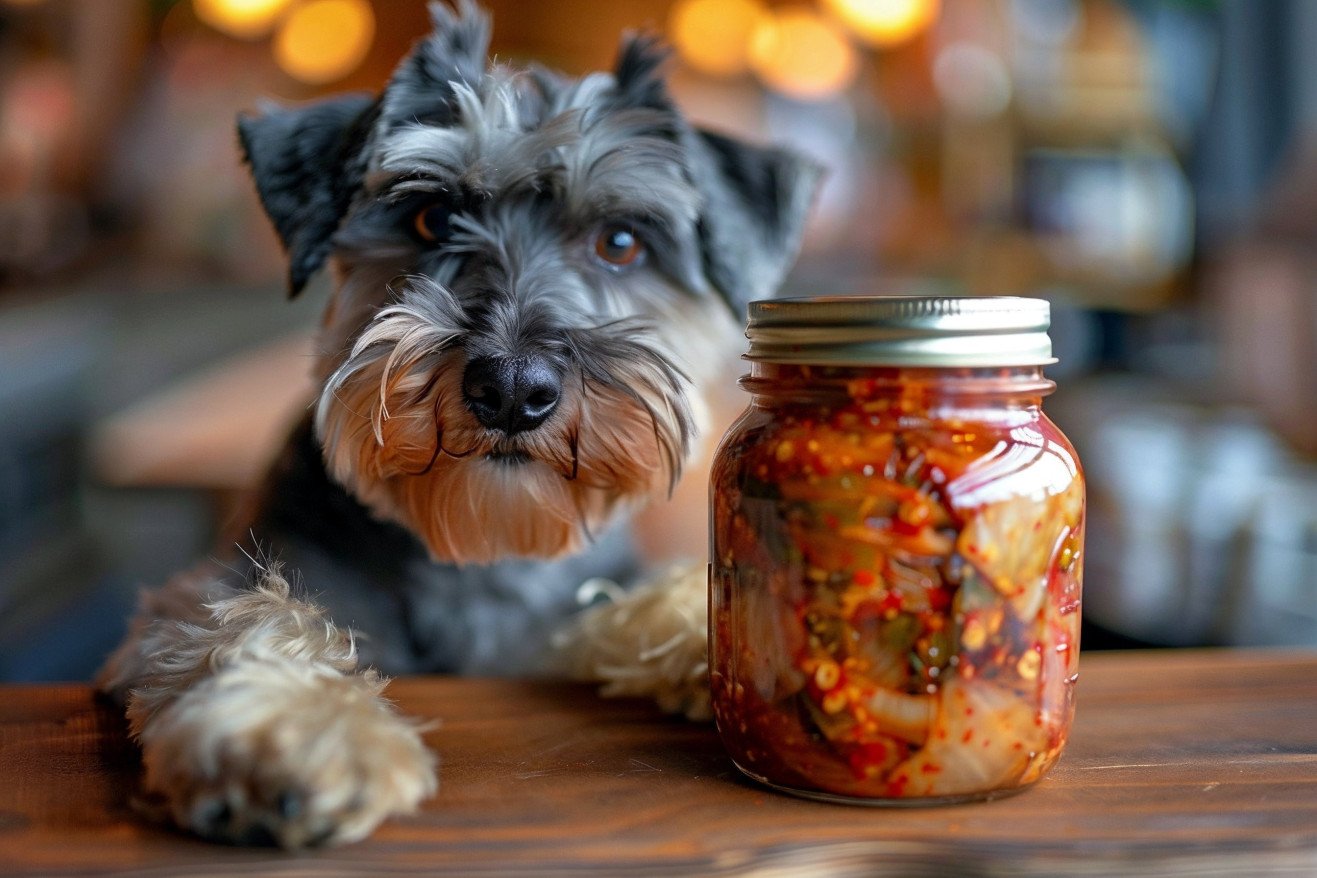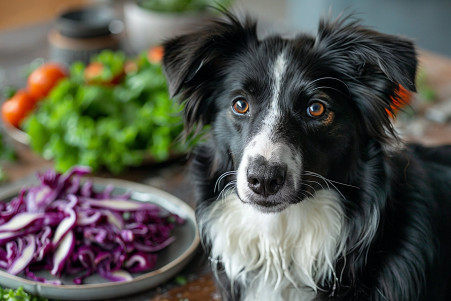Can Dogs Eat Kimchi? Breaking Down the Safety
5 May 2024 • Updated 4 May 2024

Whether you want to introduce your dog to Korean food or you're just curious about what human foods are OK to feed dogs, the question of whether dogs can eat kimchi is an important one. While kimchi isn't poisonous to dogs, the spices, garlic, onions, and fermented cabbage in it can lead to gastrointestinal issues like diarrhea and vomiting. Therefore, dogs should not be given kimchi or any foods that contain these ingredients.
This article takes a look at what veterinarians have to say about how dogs' digestive systems work and how the ingredients in kimchi can affect them. By looking at clinical research and input from vets, we aim to give pet owners a comprehensive understanding so they can decide whether or not to add human food to their dog's diet. Our hope is to give you the information you need to make sure you're meeting your dog's nutritional needs while keeping them safe from the potential dangers of an inappropriate diet.
Can dogs eat kimchi?
Are There Any Health Benefits to Fermented Foods for Dogs?
Fermented foods like kimchi are loaded with probiotics, which can have a number of positive effects for our furry friends. As noted by the Doylestown Veterinary Hospital, these foods are full of good live bacteria that can help improve the gut and immune health of dogs. Not only does the fermentation process help create a rich and diverse probiotic profile, it also increases the bioavailability of nutrients, which means the nutrients are easier for the body to digest and absorb.
Probiotics are important for helping to restore the balance of gut microbiota, especially after a course of antibiotics, which can throw off the body's microbial balance. According to research, probiotics can also help reduce inflammation and manage blood glucose levels, which can help improve overall health. In addition, kimchi and other fermented foods can help with detoxification by breaking down preservatives and pesticides in a dog's diet. In fact, research has shown that there are compounds in kimchi that can help the body get rid of these toxins.
By adding probiotic-rich fermented foods to a dog's diet, pet parents can help improve their pet's health in a number of ways, including better digestion and nutrient absorption, a stronger immune system, and better overall health. As Django points out, fermented foods like their Gussy's Gut topper can also help make up for the nutritional deficiencies in today's highly processed pet foods, making it easy to add these superfoods to a dog's diet.
Dangers and Potential Toxicity of Regular Kimchi for Dogs
Many traditional kimchi recipes include ingredients that are toxic to dogs, such as garlic, onions, and hot peppers. According to Can Dogs Eat Kimchi? | Health Risks, garlic and onions are toxic to dogs and can cause gastrointestinal issues like vomiting, diarrhea, and even anemia in severe cases.
Meanwhile, the high sodium levels in kimchi can cause dehydration, electrolyte imbalances, and even kidney issues in dogs, according to Can Dogs Eat Kimchi? Here's 7 Helpful Insights. In addition, the spiciness of chili peppers can cause further irritation in a dog's digestive system, leading to pain and inflammation.
In addition, store-bought kimchi can contain preservatives and other ingredients that can be toxic to dogs in large amounts. As the JustAnswer veterinary consultation notes, it's best to stick to low-sodium or homemade kimchi to make sure your dog stays safe while eating it.
Homemade Dog Kimchi Recipes and Other Options
In order to enjoy the benefits of fermented foods in a way that is safe for dogs, pet parents can make their own dog-friendly kimchi. According to The Natural Canine Kitchen, these recipes should avoid ingredients that are toxic to dogs like garlic, onions, and hot peppers, and instead use dog-safe ingredients like ginger and coconut.
The Natural Canine Kitchen even offers a comprehensive recipe for dog-friendly kimchi, which is based on a mix of fermented vegetables including cabbage, carrots, radishes, and zucchini. Other fermented foods that are rich in probiotics, such as sauerkraut, kefir, and unsweetened yogurt, can also be given to dogs in moderation, according to Dogster.
However, whenever new fermented foods are being introduced, it's important to follow the advice of the experts at The Natural Canine Kitchen and start with small amounts, watching for the dog's reaction before increasing the quantity. This way, the dog's digestive system can adapt to the new probiotic-rich food more easily.
Symptoms of Kimchi Toxicity and What to Do
If a dog eats a large amount of traditional kimchi or a product that contains toxic ingredients like garlic or onions, it's important to watch for symptoms of toxicity. According to Can Dogs Eat Kimchi? Here's 7 Helpful Insights, symptoms of kimchi toxicity in dogs can include vomiting, diarrhea, abdominal pain, lethargy, and loss of appetite.
In more serious cases, garlic and onion toxicity can cause anemia and damage to red blood cells, so the dog will need to be seen by a vet right away. As noted in the JustAnswer vet response, if a dog is in distress after eating kimchi, you should call your vet to get advice on the next steps. Your vet may recommend supportive care, such as giving the dog fluids and feeding them a bland diet, until their symptoms improve.
More Probiotic-Rich Fermented Foods for Dogs
While traditional kimchi isn't something that dogs can eat regularly, there are other fermented foods that can offer the same probiotic advantages without the potential downsides. Fermented vegetables like sauerkraut, fermented carrots, and fermented green beans are all great sources of probiotics and can be added to a dog's diet safely, according to WebMD.
Unsweetened, plain yogurt and kefir are also probiotic-rich dairy products that can be given to dogs in moderation, as long as they aren't lactose intolerant, says Yitto Paws. For those who are looking for vegan alternatives, fermented plant-based yogurts, kombucha, and fermented vegan cheeses can also be used to give dogs the probiotic benefits they need, according to Bonza.
No matter what kind of fermented food is being added, it's important to make sure that the dog is given a small amount at first and then the amount is gradually increased based on their tolerance and response to the food. This will help make sure that their digestive system can handle the new probiotic-rich food.
Conclusion: Use Moderation and Consideration for Dogs' Dietary Needs
Fermented foods like kimchi can provide dogs with probiotic and nutritional benefits, but the ingredients in traditional recipes can be toxic if eaten in large amounts. Therefore, pet owners should be careful when adding any human food, including kimchi, to their dog's diet and watch for any signs of an adverse reaction.
Instead, pet owners may want to consider making their own fermented foods for their dogs or using other probiotic-rich options like sauerkraut, yogurt, and kefir. When adding fermented foods to a dog's diet, it's important to use moderation and introduce them slowly, as every dog will respond to new foods differently.
Pet owners can also talk to a veterinarian or pet nutritionist to get personalized advice on how to add fermented foods and probiotics to their dog's diet based on their dog's unique health and nutritional needs.


